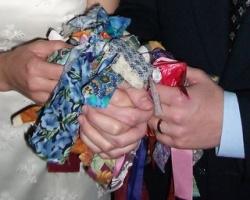To Israel Wayne, marriage “was equivalent to the prospect of living as a missionary in some foreign land where you know you may end up a martyr,” he said. “You can accept it and believe it, but it’s hard to be enthusiastic about it.” Yet within two weeks of his mother suggesting a wife to him over lunch in Michigan, Mr. Wayne would engage himself to Brooke Tingom, an Arizona woman he had barely seen face to face. Their wedding took place about five months later, on Jan. 23, 1999. The Waynes have been happily married ever since and now have five children.
“In seeking to live every area of life fully trusting the Lord, we could not help but see that He desired us to trust him even in the area of marriage,” Mr. Wayne said. “We honor and respect our parents and their wisdom … They’ve experienced more life than we have; they may have insights that are helpful to us.”
The process that the Waynes chose, called betrothal, requires a man and woman to make a binding commitment to marry before beginning any romantic — much less physical — relationship. Generally, the couple’s parents are responsible for arranging the match.
Betrothal is spreading among fundamentalist Protestants, particularly homeschoolers. The process varies, making it hard to estimate how many couples use it. For some, betrothal closely resembles chaste courtship or dating. For others, it’s more like an arranged marriage. But according to Jonathan Lindvall, the head of the ministry Bold Christian Living and an advocate of betrothal, the idea seems to be gaining popularity in Idaho, Illinois, Ohio, and Texas, as well as more liberal hubs like Colorado and Minnesota, which have zealous Christian communities.




